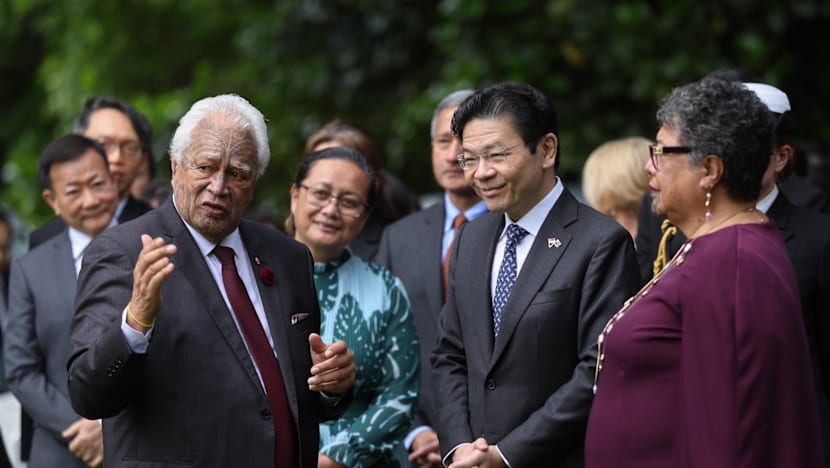Deepened ties with Australia, New Zealand will bring tangible benefits to Singaporeans: PM Wong
A boost to security cooperation and economic connectivity between Singapore and Australia, as well as enhanced trade in essential supplies between Singapore and New Zealand were among the agreements that were inked.

Prime Minister Lawrence Wong being welcomed to New Zealand in a pōwhiri, a traditional Māori welcoming ceremony. (Photo: Facebook/Lawrence Wong

This audio is generated by an AI tool.
SINGAPORE: Hailing the successful conclusion to a six-day official visit to Australia and New Zealand, Prime Minister Lawrence Wong said on Friday (Oct 10) that the deepened ties with both nations will “certainly bring tangible benefits” to Singaporeans.
Mr Wong, who was making his first trip to both countries as prime minister, had launched an upgraded Comprehensive Strategic Partnership (CSP) with Australia on Wednesday, and on Friday elevated ties with New Zealand to a CSP.
Among the agreements inked are a boost to security cooperation and economic connectivity between Singapore and Australia, as well as enhanced trade in essential supplies between Singapore and New Zealand during times of crisis.
Speaking to the Singapore media at the conclusion of his visit, Mr Wong said Australia and New Zealand are Singapore's "closest and most trusted partners".
Mr Wong said that when trade relations are elevated to a CSP, “we want to make sure that there is substance in the relationship”, he said.
“Indeed there has been substance in the relationship with Australia and New Zealand. We have had the CSP with Australia for 10 years, upgrading it now, and we are now upgrading the relationship with New Zealand to also a CSP,” he added.
The tangible benefits can come in the form of more opportunities, because there will be more trade and investment flows and more investments into Singapore that will create more jobs for Singaporeans.
He added that there can be other benefits - such as with the ‘first of its kind’ deal with New Zealand to trade essential goods even in times of crisis, and a similar memorandum of understanding with Australia.
“Because in times of crisis, in times of disruptions, we can be assured of essential supplies like food coming through Singapore and coming to Singaporeans,” he said.
“So these are all concrete ways in which we will benefit.”
"ALL THAT WE ARE PURSUING ARE MEANS TO AN END"
Asked about how the benefits from these enhanced trade relations will be communicated to the man on the street, Mr Wong said that the first step is through businesses.
“Because the businesses need to understand the opportunities there are through free trade agreements, through investment agreements, through green economy partnerships,” said Mr Wong.
“The key beneficiaries in the first instance, in many of these arrangements, are businesses.”
For instance, such bilateral deals can help Singapore businesses can “do more” overseas, while foreign businesses can also be attracted to Singapore, which would create more jobs here.
While most Singaporeans may not be prepared or interested to go into the details of every bilateral agreement, Mr Wong said such information will still be made public.
He said that what matters more to most Singaporeans is that their lives are getting better, that there are jobs available and that prices are affordable.
“So it's not about the specifics and the technicalities, but the concrete outcomes,” he said. “So all that we are pursuing are means to an end.”
“So rather than dwell on the means, we want to be able to achieve concrete actions which will lead to eventually better outcomes for Singaporeans, which they will certainly experience.”
While Singapore "instinctively" looks towards ASEAN, China and India as well as other East Asian economies to forge partnerships, Mr Wong said Australia and New Zealand should also be included in the mix.
He then noted that both countries are open and advanced economies that complement Singapore in various aspects, such as in trade, innovation, connectivity and sustainability.
"There is a lot that we can do together by harmonising standards, streamlining business processes, bringing our business communities closer together and then setting new and more ambitious standards, for example, in digital trade, in the green economy, or in new fields like artificial intelligence," said Mr Wong.
These are ways in which Australia, New Zealand and Singapore can create frameworks and set standards for the rest to follow, he added.
He added that creating these frameworks is "very much in our interest".
"Because we've always said that we want a region that's not dominated by any single power, that rejects zero sum competition, that continues to engage all the major powers," he said.
Therefore, cooperation in this new environment should never be limited to just countries within the region alone, he added.
"We don't want a world that's going to be ending up in competing spheres of influence or exclusive blocs," he said.
"We want a region that's open and inclusive, and our cooperation with Australia and New Zealand very much enables them."
















